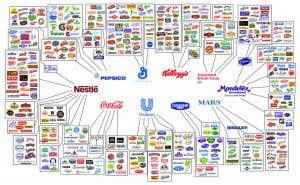Cameron McElmurry’s well written blog post (https://sites.uw.edu/pols385/2020/04/13/a-plague-overlooked-the-locust-crisis-lurking-in-the-shadow-of-covid-19/) discussing the locust crisis occurring in the Horn of Africa gives the reader a look into the world of climate change and how it has increasingly played a role in causing global catastrophes.

In this photo taken Thursday, Jan. 16, 2020, a Samburu boy uses a wooden stick to try to swat a swarm of desert locusts filling the air, as he herds his camel near the village of Sissia, in Samburu county, Kenya. (AP Photo/Patrick Ngugi)
What Cameron and many others neglect to mention is that climate change itself is the by-product of a much larger issue. Although the word ‘neoliberalism’ gets thrown around quite often, the concept still manages to lurk in the shadows of climate change discussions, even though it plays a pivotal role in driving the rising temperature of the planet.
Neoliberalism is often thought of as a neutral force, one that is victim to the ebbs and flow of consumerism, when in reality it is the very force driving these patterns. One of the main tropes we in society are expected to believe is that our consumer choices are a part of our independent thought process, completely driven by our own free will and untainted by the environment which surrounds us. This illusion of choice that neoliberalism has spoon fed Americans in particular, is one of the main reasons why the issue of climate change is often blamed on the consumer. After all, our choices are what drives the demand and if we simply lived more sustainable lives (had gardens in our backyards, shopped at farmers markets, supported small business and overall made more environmentally conscious decisions, etc.), then this whole “global warming” fiasco wouldn’t be happening in the first place, right? This narrative is the blindfold that mass-corporations and governments alike tie neatly around the heads of citizens. Neoliberalism is such an effective deflective force that G20 countries are getting away with spending $88 billion per year subsidizing exploration for new fossil fuels without much more than a slap on the wrist from their citizens (article mentioned in class: https://grist.org/climate-energy/rich-countries-are-still-wasting-billions-on-subsidies-for-fossil-fuels/).

This image is an example of the illusion of choice in consumer brands, particularly in the food system.
Even more alarming is that $88 billion is just what has been invested in finding new fossil fuels. Globally, a whopping $775 billion has been spent in subsidies for the production and use of fossil fuels. As mentioned in the article, these subsidies come in “three basic forms: investment by state-owned enterprises, direct national subsidies and tax breaks, and public finance.” It almost seems as though locusts are not the only pests threatening the livelihoods of people. At the end of the day, if we want to truly work towards a safer future for all inhabitants of the planet, we must un–tie the blindfold neoliberalism has wrapped intricately around the eyes of citizens and expose people to the fuel that truly drives climate change.
Video: https://www.youtube.com/watch?v=u4Y3OEDdpJA this YouTube video highlights some of the overlooked effects of climate change (warning: discusses suicide).
